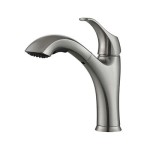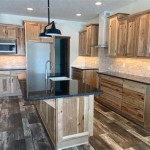What Is The Average Cost Of A Kitchen Renovation?
Kitchen renovations are a popular way to improve the aesthetics and functionality of a home. They can also be a great way to increase its value. However, kitchen renovations can also be expensive. The average cost of a kitchen renovation varies widely, depending on several factors, such as the size of the kitchen, the materials used, and the complexity of the project. A thorough understanding of the costs involved is crucial to ensure that the project stays within budget.
Factors Affecting Kitchen Renovation Costs
The cost of a kitchen renovation can be broken down into several key components:
1. Size of the Kitchen
A larger kitchen will naturally require more materials and labor, leading to higher costs. The square footage of the kitchen is a primary factor in determining the overall cost. A small kitchen renovation might be simpler and less expensive than a large-scale overhaul.
2. Materials
Material choices heavily influence the overall cost. High-end materials like granite countertops, custom cabinetry, and stainless steel appliances will significantly increase the budget compared to using more affordable options like laminate countertops, standard cabinetry, and basic appliances.
3. Complexity of the Project
The complexity of the renovation plays a major role in the final cost. A simple makeover involving painting, new hardware, and minor cosmetic upgrades will be less expensive than a full-scale renovation that includes structural changes, plumbing and electrical work, and new flooring.
4. Labor Costs
Labor costs are a significant component of renovation costs, accounting for a substantial portion of the overall budget. Depending on the location and the complexity of the project, skilled labor, such as plumbers, electricians, and contractors, can charge varying rates.
Cost Breakdown
It is helpful to break down the cost of a kitchen renovation into its components to understand the price variations. Here's a general overview of the cost breakdown for a standard kitchen renovation:
1. Demolition and Hauling
This step involves removing existing cabinets, countertops, appliances, and flooring. The cost of demolition and hauling away debris can range from $500 to $2,000, depending on the size and complexity of the project.
2. Cabinetry
Cabinets can be one of the most significant expenses. The cost of cabinets depends on the size, style, material, and whether they are custom-made or stock. Basic stock cabinets can cost $100 to $300 per linear foot, while custom cabinets can range from $500 to $1,000 per linear foot.
3. Countertops
Countertop materials vary widely in price, from budget-friendly options like laminate to high-end materials like granite, quartz, and marble. Laminate countertops can cost $20 to $40 per square foot, while granite can cost $40 to $100 per square foot.
4. Appliances
Appliance costs can vary significantly depending on the brand, features, and size. A basic refrigerator can cost $500 to $1,500, while a high-end refrigerator can cost $3,000 or more. The same applies to ovens, dishwashers, and other appliances.
5. Flooring
Flooring options, such as hardwood, tile, vinyl, and laminate, each have different cost ranges. Hardwood flooring can cost $5 to $15 per square foot, while tile can cost $3 to $10 per square foot. The cost of installation is an additional expense.
6. Plumbing and Electrical
If the renovation involves significant plumbing or electrical work, these costs can add up quickly. Replacing pipes, fixtures, and electrical wiring can range from a few hundred dollars to several thousand dollars depending on the scope of the work.
7. Labor
Labor costs can account for a significant portion of the total renovation cost. The hourly rate of contractors and skilled labor can vary depending on location, experience, and the complexity of the project. It's essential to obtain quotes from multiple contractors to compare labor costs.
Cost-Saving Tips
While a kitchen renovation can be expensive, several strategies can help minimize costs:
1. DIY Projects
Consider taking on tasks like painting, demolition, and installing some fixtures yourself. This can save on labor costs, but it's essential to have the necessary skills and safety precautions in place.
2. Shop Around for Materials
Compare prices from different suppliers for cabinets, countertops, appliances, and flooring. Look for sales, discounts, and clearance items to save money.
3. Choose Budget-Friendly Materials
Consider using less expensive materials like laminate countertops, stock cabinets, and basic appliances instead of high-end options. This can significantly reduce the overall cost without sacrificing aesthetics and functionality.
4. Reuse Existing Materials
If possible, consider reusing existing materials, such as cabinets, fixtures, and appliances. This can save money and reduce waste.
5. Plan Ahead
Thorough planning before starting the renovation can help avoid costly mistakes and ensure that materials are ordered efficiently. A well-defined plan can also help keep the project on schedule and within budget.

Kitchen Remodeling Cost Guide 2024 Sweeten Com

The Cost Of A Kitchen Remodel Understanding Your Budget

Kitchen Remodeling Costs In New Jersey 2024 Sweeten Com

Cost To Remodel A Kitchen The Home

Kitchen Remodeling Costs Process Deerfield Beach Pompano Fl

Average Cost Of A Kitchen Remodel Los Angeles Build Method Construction

Kitchen Remodel Costs Cosmetic Remove Replace

How Much Does A Kitchen Remodel Cost 2024 Average

How Much Do Kitchen Renovations Cost Kitchens Inc

Kitchen Remodel Cost Guide Where To Spend And Save
See Also








